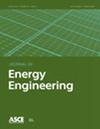基于马尔可夫链模型的无人机威胁概率预测方法初探
IF 1.8
4区 工程技术
Q4 ENERGY & FUELS
引用次数: 0
摘要
本文章由计算机程序翻译,如有差异,请以英文原文为准。
A Preliminary Study on the Prediction Method for the Probability of Drone Threats Using Markov Chain Model
求助全文
通过发布文献求助,成功后即可免费获取论文全文。
去求助
来源期刊

Journal of Energy Engineering
工程技术-工程:土木
CiteScore
4.10
自引率
13.60%
发文量
61
审稿时长
3.1 months
期刊介绍:
The Journal of Energy Engineering reports on the scientific and engineering knowledge in the planning, development, management, and finances of energy-related programs. The journal is dedicated to civil engineering aspects of the issues, sources, and programs that are either directly related to, or can ultimately contribute to, the production, distribution, and storage of energy. Multidisciplinary subjects are especially encouraged.
Original contributions are encouraged in, but not limited to, the following areas: generation of electric power; nuclear power issues; energy planning (planning for generation capacity expansions, hydropower planning, network and transmission planning, reliability); energy policy and economics (financial and customer markets, regulatory and financial issues); energy development (solar power, renewable energy, waste-to-energy systems); energy systems operation (thermal and hydropower operation and optimization, scheduling, load forecasting, demand-side management); energy efficiency, reducing consumption of or conservation of energy; energy sustainability as related to energy and power production, distribution, and usage; waste management and environmental issues; and energy infrastructure issues (power plant safety, security of infrastructure network).
 求助内容:
求助内容: 应助结果提醒方式:
应助结果提醒方式:


